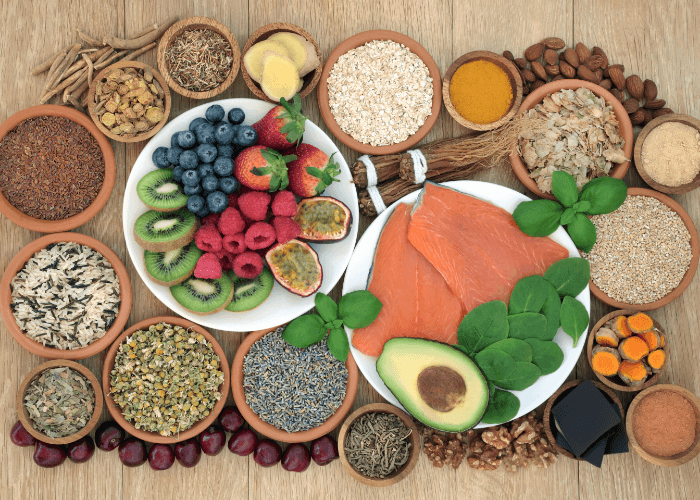Battle Stress and Anxiety With These 5 Types of Foods
Can stress and anxiety be regulated by minding the products you put on your plate?
First thing first – there is no such thing as a magical pizza that you can eat and immediately achieve the ultimate level of psychological well-being. Of course, any regular pizza can give you a fleeting feeling of happiness, but that is usually not a solid long-term strategy.
Anyway, there is an extended research base that investigates all the ways our diet affects our emotional and cognitive well-being, and – unsurprisingly – some foods prove more beneficial than others.
Below, you will find the top five groups of foods that demonstrate a positive effect on the psychological state – as well as the ways they actually achieve that.
Magnesium-Rich Foods for Managing Stress and Anxiety
Magnesium is a well-known mineral that relieves muscle tension and promotes overall relaxation in the body. Moreover, it plays an important role in metabolizing cortisol – one of the main stress hormones, along with adrenaline and norepinephrine.
Now that science has spoken, here are some of the magnesium-rich foods you can add to your diet in order to naturally battle stress and tension:
- Pumpkin seeds;
- Cashews and almonds;
- Broccoli and spinach;
- Bananas and papayas;
- Dried figs;
- Avocados, etc.
And – take this as a bonus – dark chocolate!
Probiotic Foods
In 2020, the University Health News published an article on the so-called “psychobiotics”. Put shortly, these are a type of probiotics that are shown to have a positive effect on patients that suffer psychological distress or psychiatric illness.
Psychobiotics improve the gut-brain connection, thus boosting the mood, relieving the episodes of anxiety, and even easing depression to a certain extent. If you want to enhance your gut microbial diversity and enjoy the side perks, you can boost your diet with:
- Natural and unsweetened yogurt;
- Fermented vegetables;
- Probiotic drinks such as kefir and kombucha;
- Soft cheeses and sourdough bread.
Of course, there are multiple probiotic products available as a food supplement. You can choose and take such a product after you meet up with your doctor and get their personalized recommendations.
High-Fiber Foods
Dietary fiber improves your peristalsis, feeds the good bacteria in your intestines, and can also prove beneficial for your weight control plan. In addition, recent research suggests that a fiber-rich diet can be surprisingly good for brightening your mood and balancing your behavioral patterns.
More specifically – in research published by the National Center of Biotechnology Information, fructooligosaccharide and galactooligosaccharide actually improved anxiety and depression in participants that consumed around ≥ 5 g per day.
Some of the healthiest (and yummiest!) fiber-rich foods against stress and anxiety are:
- Whole grains and beans;
- Nuts and seeds;
- Virtually all types of raw fruits and vegetables.
If you’re looking for a guilty fiber pleasure here, keep in mind that home-made popcorn now has a legitimate place in your well-being program!
Omega-3s
Modern nutritional sciences have already spread the word that not all fat is bad for your health. On the contrary – healthy fats are just as vital for your well-being as protein, fiber, vitamins, and minerals.
Omega-3 fatty acid, for example, is proven to reduce inflammation, support the proper blood flow in the brain, and regulate neurodevelopment through serotonin. Long story short – this fatty acid is even officially used as a supplement in treating conditions like depression, generalized anxiety, and schizophrenia.
You can get your daily dose of Omega-3 support from natural sources like:
- Fish, caviar, and other seafood;
- Seeds and nuts;
- Cold-pressed plant oils;
- Seaweed and algae;
- Brussels sprouts
- Kale, spinach, broccoli, and cauliflower.
Also, many products on the market come fortified with Omega-3, and this may include yogurt, juices, traditional and nut milk, etc.
Herbal Teas and Spices for Stress and Anxiety
Finally, traditional herbal medicine has been used for balancing the mood and the nervous system for millennia now. There are multiple medicinal plants and local spices that your grandma has probably told you about, but – surprisingly or not – modern science actually confirms.
The active ingredients in these plants have adaptogenic properties, stress-reducing effects, and an overall positive impact on brain function and mood-regulating hormones. Your natural artillery can include – but not limit itself to – the following:
- Valerian root;
- Passionflower;
- Chamomile;
- St. John’s wort;
- Lemon balm;
- Rhodiola;
- Licorice;
- Lavender;
- Ashwagandha, etc.
Also, mood-balancing spices such as turmeric, cinnamon, and ginseng now come in the form of capsules and powders that you can easily add to meals, smoothies, and even juices.
So, will your psychological state magically reach an all-time peaking level of serenity once you add these foods to your diet? Probably not.
But will you start feeling a mood boost once you have these as a long-term part of your daily diet? Most probably yes.
Add regular physical activity, quality rest, and a supportive social environment, and you will have all the prerequisites of doing better than you are today. Just because being well always begins with eating well, and the rest is up to you and your intelligent self-care routine against stress and anxiety.


